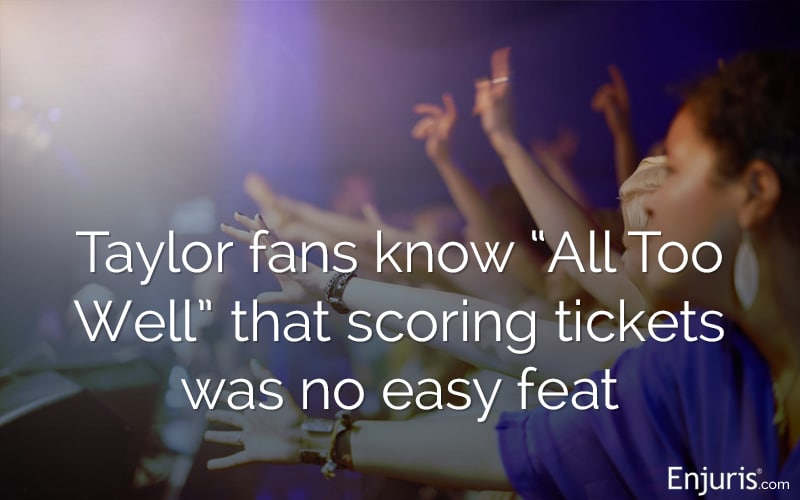
Remember the case last summer when Disney attempted to force a widower into arbitration? Disney claimed the lawsuit filed by Dr. Rangsuan's husband should be handled out of court due to an arbitration clause he’d unknowingly agreed to when he signed up for a one-month Disney+ trial.
Or perhaps you recall the case of John and Georgia McGinty, who were barred from suing Uber for injuries sustained in a car accident because their daughter, with her parents' permission, had checked an innocuous box when ordering pizza through Uber Eats.
These cases illustrate how arbitration clauses have crept into places most people don’t expect—now, score another point for fine print.
The recent case of Naimoli et al. v. Pro-Football, Inc. et al. highlights the troubling reach of arbitration clauses. On October 29, 2024, the U.S. Court of Appeals for the Fourth Circuit ruled that even though Philadelphia Eagles fans who attended a Washington Commanders game didn’t purchase their own tickets, they could still be bound by an arbitration clause associated with those tickets. Here’s what happened and what this precedent could mean for ticketed event-goers everywhere.
The background of the case
On January 2, 2022, Michael Naimoli Jr., Morgan French, Andrew Collins, Marissa Santarlasci, and others traveled from New Jersey to attend an Eagles vs. Commanders game at FedExField (now Northwest Stadium). They attended the game as guests of Brandon Gordon, who bought nine tickets through TickPick and then transferred them to his Apple Wallet.
The group was standing near the tunnel to cheer on their team when the railing gave way, causing several fans to fall up to 10 feet onto the concrete below. Naimoli, French, Collins, and Santarlasci sustained injuries and filed a lawsuit against the Commanders and FedExField for negligence.
However, the Commanders argued that the lawsuit couldn’t proceed in court because the ticket terms included a mandatory arbitration clause. They argued that since Gordon was the ticket purchaser and his account displayed the terms, his friends were bound by the arbitration clause, even though they had no direct interaction with the terms or knowledge of them. The trial court initially disagreed, but the Fourth Circuit overturned that decision, setting a significant precedent for arbitration clauses tied to ticket purchases.
Learn more about arbitration and how it differs from going to court or mediation.
The court’s opinion
Judge Paul V. Niemeyer, writing for the Fourth Circuit, argued that the Commanders were justified in assuming that Gordon had the “apparent authority” to act on behalf of the other attendees. The court reasoned that purchasing multiple tickets typically implies that the buyer is acting on behalf of others. Since the group entered the stadium using Gordon’s tickets stored on his phone, the court determined that Naimoli, French, Collins, and Santarlasci implicitly accepted Gordon’s role in handling ticket terms on their behalf.
However, there was still a question about whether Gordon himself agreed to the arbitration clause. Gordon asserted that he never saw or agreed to such terms when purchasing or transferring the tickets, while the Commanders claimed otherwise. Judge Niemeyer noted the disputed accounts of whether arbitration terms were displayed during the purchase and remanded that issue back to the lower court for further review. The decision that Gordon’s group could be bound by his agreement, though, remained intact as a ruling that could impact future cases involving third-party ticket holders.
You can read the full opinion of the court here.
What this decision means for event-goers
This case sets a troubling precedent. By allowing a ticket purchaser’s acceptance of an arbitration clause to bind their guests, the court has opened the door for sports teams, concert venues, and other ticketed events to enforce arbitration—even on those who never directly agreed to the terms or may not even be aware of them.
Companies often prefer arbitration because it keeps disputes private, limits plaintiffs’ options for redress, and effectively eliminates the chance for class-action lawsuits. For fans and concert-goers, being forced to handle claims through private arbitration due to terms they didn’t personally agree will seem both unfair and restrictive.
How you can protect yourself
Protecting yourself from these binding clauses can be challenging, but here are a few steps to consider:
- Ask to see the ticket terms: If you’re attending an event on a ticket someone else bought, ask to review any terms attached to the purchase. Although it may feel a little awkward, it can help you understand any legal rights you may be waiving.
- Check for arbitration clauses: While it may be easy to overlook, reading the fine print on event tickets could prevent future legal surprises. Look for keywords like “arbitration,” “binding,” or “waiver of jury trial.”
- Seek legal advice early: If you’re injured at an event and believe negligence is involved, consult a lawyer familiar with arbitration law. They can review the ticket terms and determine if you have grounds to challenge arbitration enforcement.
- Stay informed about policy changes: Increasingly, companies are embedding these clauses into digital interactions, like app-based ticket purchases. Keeping up-to-date with policies on sites like Ticketmaster or apps you frequently use for tickets can be crucial to understanding your legal position.
As companies increasingly rely on arbitration clauses to limit liability, consumers need to stay vigilant. While the Fourth Circuit’s decision may have restricted options for some fans, being informed about these terms and knowing what to watch for can help protect you from finding yourself unexpectedly bound by limitations you didn’t agree to.
Taylor Swift Fans File Class Action Lawsuit Against Ticketmaster
It’s a “Cruel Summer” for Swifties who couldn’t get Eras Tour tickets. Now some of them are suing Ticketmaster.

